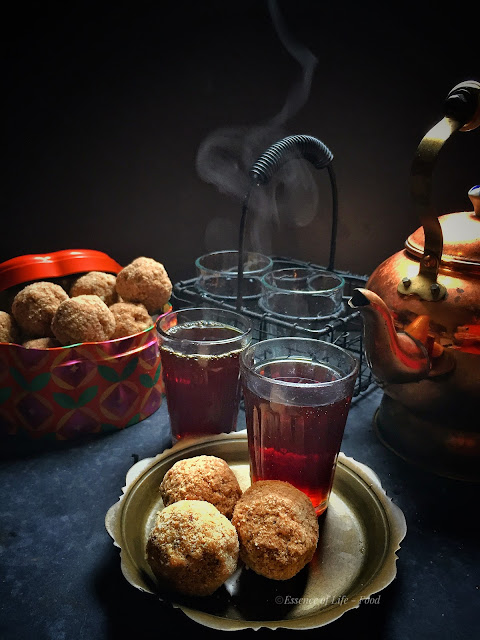DESSERTSFOR THE SWEET TOOTHINDIAN RECIPESINDIAN SWEETSNAIVEDYAM/PRASADHAMPAYASAM / PRADHAMAN / KHEERREGIONAL DELICACIES
SWEET PONGAL/SARKKARAI PONGAL
Pongal is a harvest festival celebrated in Tamilnadu to commemorate the divinity of the Sun, and its major role in agriculture and cattle rearing. It is a four-day long festival celebrated at the nook and corner of Tamilnadu. As Rice is the staple crop grown in South India, along with other local produces comes this divine dish Sarkkarai Pongal/Chakkara Pongal.
Raw Rice and Moong Dhal(Pasi Paruppu) are used to prepare this Sweet Pongal and Jaggery(Cane Sugar) is used to sweeten the dish which gives the name Sarkkarai Pongal/Chakkarai Pongal. Though variant methods are prevalent throughout South India, the major ingredients stick onto the above three major ingredients along with milk, flavoured with cardamoms, dry ginger, edible camphor or clove and garnished with Cashews and Raisins roasted in Ghee.
This Sarkkarai Pongal/Chakkara Pongal recipe is a simple version which can be prepared at home for any occasion/festival. Above all this Sweet Pongal is a major Naivedhyam/Prasadham served in most of the temples or during Poojas at home. Sarkkarai Pongal/Chakkara Pongal served in temples have a special note of taste and flavour which is quite divine.
For more PONGAL RECIPES, Click here...
Cuisine - South Indian
Recipe Type - Sweet, Dessert
Difficulty - Medium
Serves - 3 - 4
Author - SM
Preparation Time - 15 - 20 Minutes
Cooking Time - 30 - 45 Minutes
Moong Dhal - 1/4 Cup
Jaggery - 1 Cup
Cardamom - 4-5 Pods
Dry Ginger Powder - a Pinch(Optional)
Cashew nuts - 10-12 Nos.
Raisins - 3 Tabspns
Raw Rice and Moong Dhal(Pasi Paruppu) are used to prepare this Sweet Pongal and Jaggery(Cane Sugar) is used to sweeten the dish which gives the name Sarkkarai Pongal/Chakkarai Pongal. Though variant methods are prevalent throughout South India, the major ingredients stick onto the above three major ingredients along with milk, flavoured with cardamoms, dry ginger, edible camphor or clove and garnished with Cashews and Raisins roasted in Ghee.
This Sarkkarai Pongal/Chakkara Pongal recipe is a simple version which can be prepared at home for any occasion/festival. Above all this Sweet Pongal is a major Naivedhyam/Prasadham served in most of the temples or during Poojas at home. Sarkkarai Pongal/Chakkara Pongal served in temples have a special note of taste and flavour which is quite divine.
For more PONGAL RECIPES, Click here...
Cuisine - South Indian
Recipe Type - Sweet, Dessert
Difficulty - Medium
Serves - 3 - 4
Author - SM
Preparation Time - 15 - 20 Minutes
Cooking Time - 30 - 45 Minutes
HOW TO COOK SWEET PONGAL/SARKKARAI PONGAL
INGREDIENTS :
Raw Rice -3/4 CupMoong Dhal - 1/4 Cup
Jaggery - 1 Cup
Cardamom - 4-5 Pods
Dry Ginger Powder - a Pinch(Optional)
For Garnishing :
Ghee - 1/4 CupCashew nuts - 10-12 Nos.
Raisins - 3 Tabspns
METHOD :
- Melt Jaggery with 1 Cup of Water and 1/2 Tspn of Ghee until the jaggery pieces dissolve completely and start to boil.
- Switch off the flame, filter the melted Jaggery to remove any impurities and keep it aside.
- Grind Cardamom Pods & Dry Ginger(if using) with Mortar and Pestle into a fine Powder and keep it aside.
- Dry Roast the Raw rice on a medium flame for about 5-7 minutes (until it is hot to touch)
- Dry Roast Moong Dhal on a low flame for about 5 minutes until the colour changes slightly and it turns fragrant. (Do not over roast the Dhals)
- Wash the dry roasted rice and dhals, drain any excess water from it.
- Pressure Cook Rice and Moong Dhal with 31/4 Cups of Water on high flame for 2 whistles.
- Lower the flame and cook for other 2-3 whistles and switch off the flame.
- Mash the cooked Rice and Dhal mix.
- Pour the melted Jaggery to the above along with powdered Cardamom and Dry Ginger Powder and mix well.
- Leave this on a very low flame until Jaggery is well absorbed into the rice and dhal mix.
- Meanwhile heat Ghee in a pan and roast Cashewnuts until golden brown colour and Raisins fluff-up.
- Pour this onto the Rice Dhal Mixture and mix well.
- Cook this on a low flame for few more minutes until you get the desired consistency.
- Serve Sarkkarai Pongal hot with a drizzle of ghee over it.
NOTES:
- Dry roasting the rice is optional.
- But dry roasting both rice and dhal enhances the aroma and gives an even texture while cooking.
- Dry Roast rice and dhal on a medium flame until they are just hot to touch. (over roasting can alter the flavour of the dish)
- Adjust the amount of water as for your rice variety.
- Can substitute one cup of Water with Milk for a rich Sarkkarai Pongal
- We need the rice and dhal to be well cooked so a bit of extra water would be needed ( more than what we use normally for cooking the rice).
- Do not over boil the Jaggery mix. We don't need to boil it into string consistency for Sarkarrai Pongal
- Adjust the sweetness to suit your taste preference.
- Adding extra ghee is strictly optional, but gives a wonderful flavour to Sarkkarai Pongal/Sweet Pongal.
- Adding Dry Ginger powder is optional.
- Can also add edible camphor and cloves to Sarkkarai Pongal if preferred.















0 comments